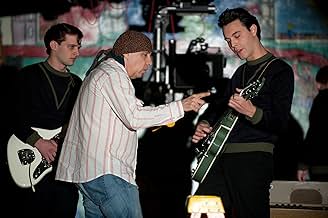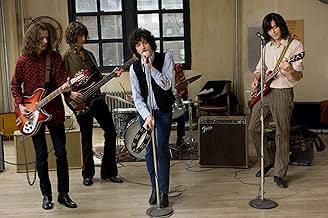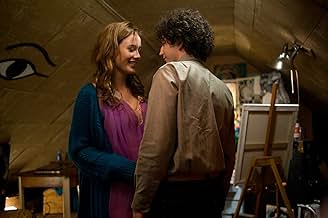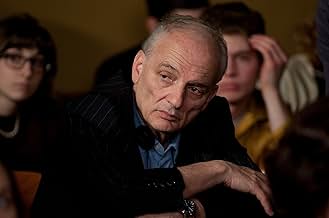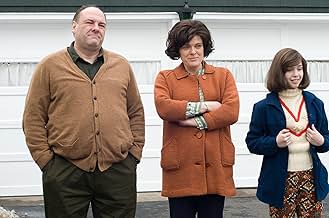NOTE IMDb
6,0/10
5,1 k
MA NOTE
Ajouter une intrigue dans votre langueSet in suburban New Jersey in the 1960s, a group of friends form a rock band and try to make it big.Set in suburban New Jersey in the 1960s, a group of friends form a rock band and try to make it big.Set in suburban New Jersey in the 1960s, a group of friends form a rock band and try to make it big.
- Réalisation
- Scénario
- Casting principal
- Récompenses
- 3 victoires et 3 nominations au total
Christopher Bannow
- Dave Smith
- (as Chris Bannow)
Avis à la une
The Sopranos' creator David Chase's directorial debut, "Not Fade Away", is, at its core, a sad movie, masked by the comedy and music that barricade my empathy. The fictional story of a 1960s teenage drummer (John Magaro) who creates a rock band with a few of his friends, "Not Fade Away" is a very character driven film, focusing primarily on the social life of the protagonist, specifically his relationship with his girlfriend (Bella Heathcorte), his band mates, and his family. I won't spoil the plot, but it is a coming-of-age tale, not as much about learning and growing as it is about doing and living. James Gandolfini is an on screen pleasure as the main character's father, while the rest of the cast, mostly lesser known actors, gratifyingly embody the 1960s rock and roll personality.
Gloriously filmed by Chase's cinematographer Eigil Bryld, the film succeeds in emitting a rock and roll cluttered vibe when the music is playing, contrasted by a dark, Godfatheresque undertone that is signature of David Chase during more dramatic scenes. While the art direction and costume design were spot on, in the end it was the music that was transporting me through time. Repeatedly watching, with the characters, The Beatles, The Rolling Stones, and Buddy Holly perform on a small black and white TV, I was sent back into the age of drugs, sex, and rock and roll. The band's original songs were probably the highlight of the film. Under the supervision of Steve Van Zandt, the music department took advantage of the actors' talented musical backgrounds and were able to conjure up some extremely enjoyable tracks that very well could've been written during the era.
My main problem with the film is the fact that it is littered with unnecessary scenes, scenes that are probably meant to indicate character development, but ultimately convey little to nothing. It also fails to establish Heathcote, the supporting actress, as an interesting or particularly likable character. Not much is ever learned about her through the course of the film while notably less significant characters remain better developed and ultimately more interesting.
When walking into the theater at the New York Film Festival, I thought I was in for another "Almost Famous". What I got was a very different movie. "Not Fade Away" is a simple picture. With a basic plot structure and relatable characters, the film is practically spoon-fed to its audiences. It is the end of the film, the final scenes, that sum up not only the movie, but the era. You must think before you proclaim a lack of closure, consider the times and the lifestyle. Rock spawned from the blues and, in the sad actuality of this movie, can't ever separate from its source. Success is 10% inspiration and 90% perspiration and in the end we often can't keep up. I recommend this vicarious joyride to all music, drama, and comedy movie lovers, as well as anyone who is looking for a party, a party that is shut down by reality. 8/10 stars.
Gloriously filmed by Chase's cinematographer Eigil Bryld, the film succeeds in emitting a rock and roll cluttered vibe when the music is playing, contrasted by a dark, Godfatheresque undertone that is signature of David Chase during more dramatic scenes. While the art direction and costume design were spot on, in the end it was the music that was transporting me through time. Repeatedly watching, with the characters, The Beatles, The Rolling Stones, and Buddy Holly perform on a small black and white TV, I was sent back into the age of drugs, sex, and rock and roll. The band's original songs were probably the highlight of the film. Under the supervision of Steve Van Zandt, the music department took advantage of the actors' talented musical backgrounds and were able to conjure up some extremely enjoyable tracks that very well could've been written during the era.
My main problem with the film is the fact that it is littered with unnecessary scenes, scenes that are probably meant to indicate character development, but ultimately convey little to nothing. It also fails to establish Heathcote, the supporting actress, as an interesting or particularly likable character. Not much is ever learned about her through the course of the film while notably less significant characters remain better developed and ultimately more interesting.
When walking into the theater at the New York Film Festival, I thought I was in for another "Almost Famous". What I got was a very different movie. "Not Fade Away" is a simple picture. With a basic plot structure and relatable characters, the film is practically spoon-fed to its audiences. It is the end of the film, the final scenes, that sum up not only the movie, but the era. You must think before you proclaim a lack of closure, consider the times and the lifestyle. Rock spawned from the blues and, in the sad actuality of this movie, can't ever separate from its source. Success is 10% inspiration and 90% perspiration and in the end we often can't keep up. I recommend this vicarious joyride to all music, drama, and comedy movie lovers, as well as anyone who is looking for a party, a party that is shut down by reality. 8/10 stars.
Not Fade Away takes me back to the Sixties when I would have been of the age that the young people of the film are in. Certainly the music was nostalgic enough and that will satisfy any number of fans.
James Gandolfini who starred as that other New Jersey legend of more recent vintage, Tony Soprano stars here as the father of aspiring musician John Magaro who wants more than anything else to succeed in Rock and Roll as those new groups from Great Britain are doing, The Beatles and The Rolling Stones. He and friends from his suburban New Jersey want to become rock stars only there's a lot more work involved than originally thought.
As for dad, Gandolfini doesn't like the kid's views or the new mod style of dress that his son is now taking up. He's a typical blue collar guy who has some real concerns about the family business and some even bigger concerns for his health. The two clash and their clash is what drives Not Fade Away.
I remember some kids on my block who were growing up including my next door neighbor in Brooklyn were doing exactly what Magaro and his friends were doing. None of them as I know stuck with music, but all apparently led successful lives, at least I've heard nothing different.
The music is wonderful if Sixties rock is your taste this is your film. The plot however is nothing that we haven't seen before. And Not Fade Away is hampered by a lack of character development other than Gandolfini and Magaro. But these two may be worth a look and a listen.
James Gandolfini who starred as that other New Jersey legend of more recent vintage, Tony Soprano stars here as the father of aspiring musician John Magaro who wants more than anything else to succeed in Rock and Roll as those new groups from Great Britain are doing, The Beatles and The Rolling Stones. He and friends from his suburban New Jersey want to become rock stars only there's a lot more work involved than originally thought.
As for dad, Gandolfini doesn't like the kid's views or the new mod style of dress that his son is now taking up. He's a typical blue collar guy who has some real concerns about the family business and some even bigger concerns for his health. The two clash and their clash is what drives Not Fade Away.
I remember some kids on my block who were growing up including my next door neighbor in Brooklyn were doing exactly what Magaro and his friends were doing. None of them as I know stuck with music, but all apparently led successful lives, at least I've heard nothing different.
The music is wonderful if Sixties rock is your taste this is your film. The plot however is nothing that we haven't seen before. And Not Fade Away is hampered by a lack of character development other than Gandolfini and Magaro. But these two may be worth a look and a listen.
just finished up watching this growing up in the sixties, and rock and roll movie. for the earliest of the Baby Boomers, this is the movie for you, and the music will rock your soul. A teenage band, with inspirations maybe a little too optimistic. With a top notch cast, and great story telling, this was indeed entertaining and very realistic, since I was in a little band back then too. James Gandolfini is great as a pretty typical sixties Father, coping with everyday problems and a pretty wacky Wife. The teenagers are very realistic, and you could tell it was written pretty much biographical. It works for me. Highly recommended especially to us Boomers.
"Not Fade Away" is one of those movies that leaves you with a bad taste after you watch the movie; it's like watching a movie by the resident cool kid in town, straddling the prettiest girl in one hand and on the other hand, going on about how he overcame his meager upbringing, dysfunctional family, disloyal friends to become who he is. The story might be genuine and the tribulations might be authentic but it's just the way it is told that makes it so unlikeable.
The movie does not have an ending (just an absurd tacked on one), creates handfuls of subplots that it never bothers to resolve and indulges heavily in the writer/director's own world of self-references and pointless pettiness. After furiously producing subplots like it's a pilot of a TV show it just ends, giving that unresolved what-ever-happened-to feeling that as a moviegoer I hate. The young Italian-American protagonist who is probably the writer/director himself doesn't have a real story to tell or a point to make. The story just meanders on and on, the key tension points leading absolutely nowhere. Rather than create a compelling story, the movie demands some sort of adulation for what it presents and ultimately insults the viewer assuming the viewer should feel privileged to hear the story rather than earning its merits.
"Not Fade Away" is advertised as a movie about a band trying to make it big; however this movie is more of a bizarre bake of 60s set pieces. There is the vintage music equipment show - the Rickenbachers, the Gretchs, the vintage Fenders and others; the vintage car show and then the 60s records - primarily an obsession with the Rolling Stones that are displayed in their big, shiny and loud glory. While the audience who were teenagers in the 60s might appreciate the shiny items of desire, the rest will find these shiny objects do not fill up a movie or compensate for a story. It's like a glossy vintage advertising brochure - pretty girls, rebellious rock stars and shiny things but not a story to tell.
The other major problem in the movie is the absolute opacity of its sub-characters. The father, the mother, the girlfriend, the band mates, the girlfriend's sister, the families are completely and utterly opaque. They keep doing bizarre things without showing or being to infer why they are doing what they are doing. Perhaps it's some sort of a 60s thing, a band thing, an Italian-American thing or a 60s band thing but I wouldn't know. The movie doesn't bother to really explain or resolve anything and it just bubbles up here and there and then it's gone. The movie is just a sequence of these strung together and it just makes all the characters unlikeable and tiring.
I like rock and roll movies but in this movie rock music neither serves as a backdrop for a personal story nor tells a story about the rock and roll greatness. The 60s backdrop overpowers the movie and the story feels like it's about a bunch of teenagers so in love with themselves that they feel they are the privileged ones. One scene comes to mind; an aunt comments, "I hear rock and roll keeps you young" to which our protagonist churlishly replies, "rock and roll is an art form. Does Dostoyevsky keep you young?"
The movie does not have an ending (just an absurd tacked on one), creates handfuls of subplots that it never bothers to resolve and indulges heavily in the writer/director's own world of self-references and pointless pettiness. After furiously producing subplots like it's a pilot of a TV show it just ends, giving that unresolved what-ever-happened-to feeling that as a moviegoer I hate. The young Italian-American protagonist who is probably the writer/director himself doesn't have a real story to tell or a point to make. The story just meanders on and on, the key tension points leading absolutely nowhere. Rather than create a compelling story, the movie demands some sort of adulation for what it presents and ultimately insults the viewer assuming the viewer should feel privileged to hear the story rather than earning its merits.
"Not Fade Away" is advertised as a movie about a band trying to make it big; however this movie is more of a bizarre bake of 60s set pieces. There is the vintage music equipment show - the Rickenbachers, the Gretchs, the vintage Fenders and others; the vintage car show and then the 60s records - primarily an obsession with the Rolling Stones that are displayed in their big, shiny and loud glory. While the audience who were teenagers in the 60s might appreciate the shiny items of desire, the rest will find these shiny objects do not fill up a movie or compensate for a story. It's like a glossy vintage advertising brochure - pretty girls, rebellious rock stars and shiny things but not a story to tell.
The other major problem in the movie is the absolute opacity of its sub-characters. The father, the mother, the girlfriend, the band mates, the girlfriend's sister, the families are completely and utterly opaque. They keep doing bizarre things without showing or being to infer why they are doing what they are doing. Perhaps it's some sort of a 60s thing, a band thing, an Italian-American thing or a 60s band thing but I wouldn't know. The movie doesn't bother to really explain or resolve anything and it just bubbles up here and there and then it's gone. The movie is just a sequence of these strung together and it just makes all the characters unlikeable and tiring.
I like rock and roll movies but in this movie rock music neither serves as a backdrop for a personal story nor tells a story about the rock and roll greatness. The 60s backdrop overpowers the movie and the story feels like it's about a bunch of teenagers so in love with themselves that they feel they are the privileged ones. One scene comes to mind; an aunt comments, "I hear rock and roll keeps you young" to which our protagonist churlishly replies, "rock and roll is an art form. Does Dostoyevsky keep you young?"
David Chase's Not Fade Away is an exercise in nostalgia in a competent order, meaning that those who enjoy or, above all, relate to the events in the film will appreciate it the most. I'm stuck in the position where I often find my self; on the corner of admiration and disappointment.
Stylistically, David Chase (TV's The Soprano's) and cinematographer Eigil Bryld (Netflix's own TV series House of Cards) couldn't have made a more bleeding-gums representation of the 1960's if they tried. It looks marvelous in all its polished, minimalist glory. Thematically and applicably, there should've been so much more of a story to tell about a garage band that never made it despite determination to "not fade away." For this reason, the film can be viewed as one where talents embrace culture, chew scenery, and nothing more.
The story concerns Douglas (John Magaro), a young man in the 1960's during a time of The Vietnam War and inevitable social change. Family values and daintiness are becoming more lenient, and views on the war divide parents, who sat back and formed opinions on it, and teenagers who had to fight it. Douglas decides to round up a few pals and start a garage band with intent to "make it big" like the iconic Beatles and Rolling Stones. Faced with loud opposition from his demanding bigot of a father (James Gandolfini) and attachment to his girlfriend (Meg Guzulescu), Douglas must now keep a band together without alienating those close to him.
This is a story that through heatbreak, aspirations, and prolific failures could've made a gripping film and possibly an emotional one. The downside is through Chase's direction does the film feel sterile and ill-equipped. He doesn't seem to possess any form of relation or personal resonance with his characters, and this awkward coldness halts the film's ability to allow its audience to admire if even differentiate the teenagers the sixties was known to birth.
What we are left with, predominately, is an egg with a firm, ambitious, beautifully crisp shell, but sub-par, underwhelming contents. "Style over substance" would seem to be an appropriate term, but I hesitate to even call it that seeing as social order, parental discrepancies, and culture shock - all easy items to exclude or nudge out of bounds - are touched on and explored considerably. One of the tensest scenes, and arguably the best, is when Douglas is at dinner with many of his relatives, remaining silent while they discuss emerging culture and minorities in a wonderfully ethnocentric way. Douglas is ostracized and belittled for his optimism on his garage band project and his long, "hippie" hair before telling off his father and exiting the room.
Chase definitely understands complex changes of norms and societal disconnect between parents and youths. However, his apparent lack of interest in his characters, giving them a shocking lack of depth and personality, undermines the power Not Fade Away could've head if it resonated with its target audience (those now in their forties or fifties). Yet, its characters are as vacant as clip-art pictures of teenagers from the time period. There's a powerful, life-affirming, deeply involving story in the material Not Fade Away provides and I anxiously await its telling by a director with more of an attitude and opinion on the subject.
Starring: John Magaro, Meg Guzulescu, and James Gandolfini. Directed by: David Chase.
Stylistically, David Chase (TV's The Soprano's) and cinematographer Eigil Bryld (Netflix's own TV series House of Cards) couldn't have made a more bleeding-gums representation of the 1960's if they tried. It looks marvelous in all its polished, minimalist glory. Thematically and applicably, there should've been so much more of a story to tell about a garage band that never made it despite determination to "not fade away." For this reason, the film can be viewed as one where talents embrace culture, chew scenery, and nothing more.
The story concerns Douglas (John Magaro), a young man in the 1960's during a time of The Vietnam War and inevitable social change. Family values and daintiness are becoming more lenient, and views on the war divide parents, who sat back and formed opinions on it, and teenagers who had to fight it. Douglas decides to round up a few pals and start a garage band with intent to "make it big" like the iconic Beatles and Rolling Stones. Faced with loud opposition from his demanding bigot of a father (James Gandolfini) and attachment to his girlfriend (Meg Guzulescu), Douglas must now keep a band together without alienating those close to him.
This is a story that through heatbreak, aspirations, and prolific failures could've made a gripping film and possibly an emotional one. The downside is through Chase's direction does the film feel sterile and ill-equipped. He doesn't seem to possess any form of relation or personal resonance with his characters, and this awkward coldness halts the film's ability to allow its audience to admire if even differentiate the teenagers the sixties was known to birth.
What we are left with, predominately, is an egg with a firm, ambitious, beautifully crisp shell, but sub-par, underwhelming contents. "Style over substance" would seem to be an appropriate term, but I hesitate to even call it that seeing as social order, parental discrepancies, and culture shock - all easy items to exclude or nudge out of bounds - are touched on and explored considerably. One of the tensest scenes, and arguably the best, is when Douglas is at dinner with many of his relatives, remaining silent while they discuss emerging culture and minorities in a wonderfully ethnocentric way. Douglas is ostracized and belittled for his optimism on his garage band project and his long, "hippie" hair before telling off his father and exiting the room.
Chase definitely understands complex changes of norms and societal disconnect between parents and youths. However, his apparent lack of interest in his characters, giving them a shocking lack of depth and personality, undermines the power Not Fade Away could've head if it resonated with its target audience (those now in their forties or fifties). Yet, its characters are as vacant as clip-art pictures of teenagers from the time period. There's a powerful, life-affirming, deeply involving story in the material Not Fade Away provides and I anxiously await its telling by a director with more of an attitude and opinion on the subject.
Starring: John Magaro, Meg Guzulescu, and James Gandolfini. Directed by: David Chase.
Le saviez-vous
- AnecdotesMost feature films slot 1-2 percent of production costs for the music budget, but in "Fade', music supervisor Steven Van Zandt, had about 10% of the $20-million-plus budget or at least $2 million.
- GaffesNobody said "elementary school" in North Jersey, at least not those days. Grades 1-6 (or 1-8 if you went to Catholic school) was called "grammar school."
- ConnexionsFeatures Pacifique Sud (1958)
- Bandes originalesPeppermint Twist
Written by Joey Dee (as Joseph Di Nicola) and Henry Glover
Performed by Joey Dee and The Starliters
Courtesy of Rhino Entertainment Company
By arrangement with Warner Music Group Film & TV Licensing
Meilleurs choix
Connectez-vous pour évaluer et suivre la liste de favoris afin de recevoir des recommandations personnalisées
- How long is Not Fade Away?Alimenté par Alexa
Détails
Box-office
- Budget
- 20 000 000 $US (estimé)
- Montant brut aux États-Unis et au Canada
- 610 792 $US
- Week-end de sortie aux États-Unis et au Canada
- 19 182 $US
- 23 déc. 2012
- Montant brut mondial
- 636 399 $US
- Durée1 heure 57 minutes
- Couleur
- Mixage
- Rapport de forme
- 1.85 : 1
Contribuer à cette page
Suggérer une modification ou ajouter du contenu manquant





